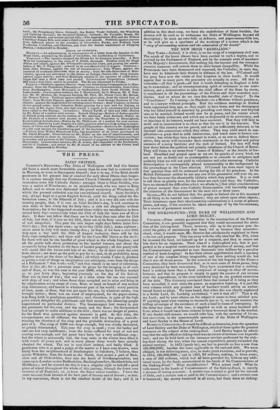SAINT SWITHIN.
THE PRESS.
CORBETT'S Reorsran.—The Duke of Wellington will find this famous old Saint a much more formidable enemy than he ever had to contend with in Massena, or even in Buonaparte himself; that is to say, if the Saint should persevere in his present line of conduct for only about fifteen days longer. It is curious enough that our Protestant Church Calendar points out for our veneration none but Catholic Saints: amongst these is Saint Swithin, who was a native of Winchester, or its neighbourhood, who was tutor to King Alfred, and to whom was dedicated the grand monastery at Winchester, of which the present cathedral was the conventional church. Saint Swithin's day, always kept as a great English festival, until the thing called the Re- formation came, is the fifteenth of July ; and it is a very old rule-with the country people, that, if it rain on Saint Swithin's day, it will continue to rain more or less every day for forty days, a rule not altogether without foundation ; for it has happened several times within my recollection to have rained forty days successively when the 15th of July has been one of those days. It does not follow that there are to be forty days rain after the 15th of July, but that, if it rain on the 15th, there are to be forty successive days of wet altogether. This year the rain began eight days before Saint Swi- thin's day ; that day made nine; up to to-day (24th July), make eighteen ; seven more in July will make twenty-five ; so-that, if we have a nice little drip once a day until the 15th of August inclusive, there will be the forty days completed ; and there will be the Corn-Bill blown to the devil : for there will not be one handful of good wheat in the whole kingdom ; and all the pretty talk about protection to the landed interest, and about the monarchy being founded on the basis of landed property ; all this pretty talk will sound like the twice-told tale of an ideot; for in must come the corn from abroad ; out must go the gold to pay for it ; and, in all probability, bang together must go the doors of the Bank ; all which would, I take it, produce as pretty a state of things as imagination can anticipate, even from the doings of a Parliament " that works well," and that stands in no need of reforming. Nor is this all; for a premium must be given for the bringing in of corn and of flour, as was the case in the year 1800, when Saint Swithin treated us to just forty days, beginning precisely on the day of his festival. That was in time of war; that was at a time when the sea was covered with ships of war ; and when those ships scrupled not to seize and bring in for adjudication every cargo of corn, flour, or meal on board of any neutral ship whatsoever, and bound to whatsoever part of the world : every particle of corn, meal, or flour, that was got upon the sea, by whatever means, was brought hither ; there was no want of employment, for the paper-money was flung forth in prodigious quantities; and, therefore, in spite of the high price which delighted the jolterheads and their tenants, the labouring people experienced no particular distress. The loaf-mongers lent money to pay the premiums for the corn, and the meal, and the flout; the Government had no scruple to make additions to the debt ; there was no danger of panics, for the Bank was protected against demands in gold. At this time, the circumstances are all different, the farmers will have low price, notwith- standing the shortness of the crop and the probable destruction of a great part of it. The crop of 1800 was large enough, but was chiefly destroyed, or greatly deteriorated. This year the crop is small ; even the barley and oats are but very indifferent ; even the beans suffered for want of wet not coming soon enough, and the pease have been but a very indifferent crop ; but the wheat is universally bad, the long rains in the winter have filled it with weeds of every sort, and in many places these weeds have actually choaked the wheat. The ear is very short indeed, and badly filled. A gentleman who is as good a judge of the matter as I have ever known, went lately from the neighbourhood of Southampton to Salisbury, I believe, then across Wiltshire, front the South to the North, then across a part of Berk- shire and all Oxfordshire, then into the heart of Northamptonshire, and came up to London across Bedfordshire, Buckinghamshire, Hertfordshire, and Middlesex ; and he assured me that it was a singular sight to behold a good piece of wheat throughout the whole of this journey, through the finest corn counties of all England; or, at least, the finest wheat counties. I have the same account from farmers of the best part of Surrey and of Sussex ; so that, in my conviction, there is not the smallest doubt of the fact; and if, in addition to this short crop, we have the malediction of Saint Swithin, the distress will be such as to embarrass the Duke of Welllinglon beyond all description •; he must set corn-bills at defiance, and paper-money-bills too, or he will give us a specimen of the workings of a system which is the " envy of surrounding nations and the admiration of the world."


















 Previous page
Previous page